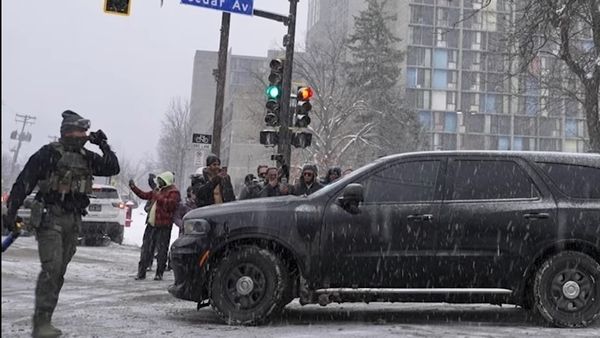
By Daphne K. Lee, Nicholas Haggerty
Taiwan may be the last place to carry on the spirit of the Tiananmen Square protests, as Hong Kong’s annual vigil is banned for the first time in 30 years.
Authorities in Hong Kong cited public health concerns as its reason to ban the planned mass gathering, though thousands defied the orders by assembling at Victoria Park and throughout the city on the evening of June 4.
The vigil in Taipei, held at Liberty Plaza in front of the Chiang Kai-shek Memorial Hall, usually draws a much smaller crowd than its counterpart in Hong Kong. Without a formal organizer this year, the Taipei commemoration attracted around 600 attendees, some of whom were Hongkongers.
“The vigil is much smaller here,” Siu Fei, 34, a Hongkonger who attended his first Tiananmen vigil in Hong Kong in 1990, told The News Lens. “But even if we’re not allowed to join the vigil moving forward, we will keep it going in every corner of the world, wherever there are Chinese people.”

The ban of the commemoration in Hong Kong was announced shortly after China approved the national security legislation, which is expected to strip the city of its remaining freedoms and civil liberties.
William Stanton, former director of the American Institute in Taiwan, witnessed the Tiananmen pro-democracy protests when he was a U.S. diplomat living in China. He said the cancellation of the Hong Kong vigil is an indication of what lies ahead for the city, a complete disregard of “One Country, Two Systems.”
Taiwan now plays a special role in keeping these vigils alive, Stanton said, as it has become a beacon of democracy in Asia, especially among Chinese-speaking countries.
“There aren’t that many voices in Asia speaking up for freedom, democracy, and rule of law,” Stanton told The News Lens, adding that he would like to see more Taiwanese stand in solidarity with Hongkongers.

In 1989, around a million students and workers gathered at Beijing’s Tiananmen Square and in cities throughout China to demand greater freedoms and accountability from the communist regime. At the height of China’s democratic exercise, the authoritarian government quashed the hopes of democracy with military tanks and gunfire. The government has never released the official death toll, mostly denying the slaughter had ever happened.
The day after the massacre, thousands of Hongkongers converged to mourn the victims in black and white clothing. For every year since, Hongkongers have joined the annual memorial, with a large turnout of 180,000 in 2019 amid the anti-extradition movement.
Taiwan, despite its lukewarm reaction prior to the crackdown, rallied to denounce the atrocities committed by the Chinese Communist Party.
In response to the gathering ban this year, thousands of Hongkongers still attended the vigil in Victoria Park despite the risk of arrest. Those who wanted to participate in solidarity were encouraged to light a candle wherever they were tonight.
Catholic churches held masses for worshippers to commemorate the Tiananmen victims, while district council members set up multiple booths within their neighborhood for Hongkongers to mark the anniversary.
May 35th (Gengzi Edition), a play about two parents who try to hold a gravesite ritual for their son who died during the Tiananmen Square massacre, was canceled due to the pandemic. The organizers decided to stream the performance for free online throughout June 4 to reach a wider audience. The director, Chan Chu-hei, said he worried that the play may not have a chance to be on stage again given the current political climate.
A Hong Kong resident who plans on attending the vigil in her neighborhood told The News Lens that the ban is meaningless because Hongkongers will find ways “to make it bloom.” For many others in the city, this may be the last year for them to publicly mourn the lives lost to fighting for democracy and freedom.
If you enjoyed this article and want to receive more story updates in your news feed, please be sure to follow our Facebook.







